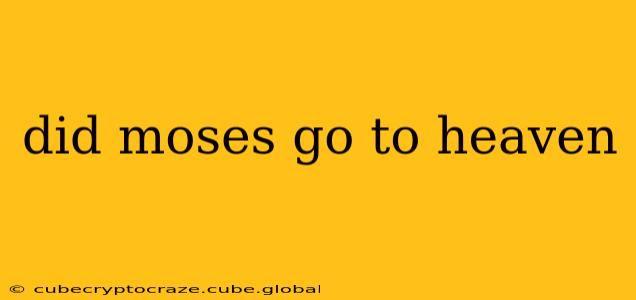The question of whether Moses went to heaven is a complex one, lacking a definitive answer within the Bible itself. Different theological interpretations and perspectives offer varied conclusions, leading to ongoing debate among religious scholars and believers. Let's explore the key arguments and perspectives surrounding this enduring question.
What Does the Bible Say About Moses' Death and Afterlife?
The Bible describes Moses' death in Deuteronomy 34:5-7: "So Moses the servant of the Lord died there in the land of Moab, according to the word of the Lord. And He buried him in the valley in the land of Moab, opposite Beth-peor; but no one knows his burial place to this day." Noticeably absent is any mention of Moses ascending to heaven or experiencing a heavenly resurrection. This absence fuels much of the ongoing discussion.
Did God Bury Moses Himself? The Significance of the Narrative
The passage emphasizes that God Himself buried Moses. This act of divine burial could be interpreted in several ways. Some believe it signifies God's special favor and protection, suggesting an elevated status in the afterlife, though not explicitly stating heavenly ascension. Others interpret it as a purely symbolic act, highlighting the mystery surrounding Moses' death and legacy.
What About the Transfiguration? (Matthew 17:1-8; Mark 9:2-8; Luke 9:28-36)
The transfiguration narrative, where Moses appears alongside Elijah with Jesus, is often cited in discussions about Moses' afterlife. However, this appearance is best understood as a visionary experience, a divine revelation rather than a literal depiction of Moses' current state. It doesn't provide conclusive evidence about his ultimate destination after death.
Different Theological Perspectives on Moses' Afterlife
Different religious traditions and theological interpretations offer diverse viewpoints:
-
Traditional Jewish perspective: Jewish theology generally focuses on the concept of resurrection at the end of times, not a specific heavenly ascent immediately after death. While Moses is revered as a great prophet, his ultimate fate is not explicitly detailed.
-
Christian perspective: Some Christian denominations interpret the absence of a specific account as leaving Moses' final destination open to interpretation. Others point to the overall Christian belief in a heaven or paradise for the righteous as implying that Moses, a righteous figure, may have gone to heaven. However, the Bible doesn't offer a concrete declaration.
-
Other faith perspectives: Other religious traditions might hold different beliefs about the afterlife and Moses' place within it, based on their own sacred texts and theological frameworks.
What About the Concept of Sheol?
In the Old Testament, "Sheol" is often translated as the "grave" or the underworld. Some interpretations suggest Moses went to Sheol, which wasn't necessarily a place of eternal punishment but a general waiting place for the dead before resurrection. This perspective avoids definitive claims about heaven, acknowledging the nuances of the Old Testament's portrayal of the afterlife.
Conclusion: The Mystery Remains
Ultimately, the Bible does not explicitly state whether Moses went to heaven. The narratives surrounding his death and the various theological interpretations leave the question open to individual faith and understanding. The focus might be less on his specific location in the afterlife and more on his significant role in biblical history and his unwavering faith. The mystery itself contributes to the enduring legacy of this pivotal figure in religious history.
